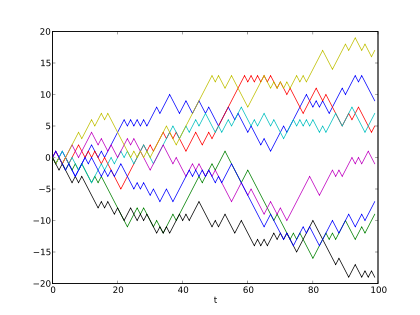Skill Game
A couple of weeks ago I wrote a post on my Unibet Ambassador blog entitled “Apokerlypse 2: Black Friday”. I’m thinking you can guess what the subject material was. A reply I received to the post was what prompted me to write this month’s piece.
“Now that there will be fewer fish in the Main Event,” went the reply, “perhaps it will be more of a skill game.” For the moment we’ll forego the discussion about whether there will be fewer fish in the Main Event (I think we can agree that there will be fewer players), but let’s consider this hypothesis in the abstract: if you take all the bad players out of the game, since only skill remains, it becomes a skill game. It figures, doesn’t it? Actually, the opposite is true. I’ll call this the Skill Game Paradox.
Consider first of all, a more well known (but perhaps not well known enough) concept in poker: volatility is related to your edge in the game. In less formal terms, the better you are than your opponents, and the more it is possible to realise that edge, the fewer swings you will suffer and the more quickly you will reach the elusive “long run”.
The reason so many players have a difficulty with this concept is, I believe, because they refuse to factor in how much one’s notional superiority over opponents (skill) is translated into genuine +EV because of other factors. These factors are many, but include: the structure of the tournament, your relative position at the table, your mood and that of your opponents, your image and that of your opponents, and so on. Combine these factors, and you get the real measure of how money making this opportunity is for you (your edge).
So that’s the first point: it’s edge which is related to volatility, not “skill”. Second point: edge and volatility are inversely correlated; in other words, the greater your edge, the less volatility you will suffer. Let’s take that concept to its extreme: if you had zero edge, you would have infinite volatility.
Consider a hypothetical tournament where all players are equally skillful (in all situations). Each player, by definition, will have zero edge over their opponents. Play this tournament out, say, one million times and the players’ bankroll graphs would all look like random walks: no particular patterns, just weaving up and down randomly.

Although exaggerated, that’s a snapshot of what the Main Event would look like without any fish. Far from the idea that it would be a skill game, it would be the opposite. It’s actually the presence of fish in the game which give it the skill factor.
Plenty of players will already know of this phenomenon. It’s the same as low stakes players complaining: “I wish I could go up the stakes where people knew what they were doing.” The illusion is that at the level where opponents would “respect my raises” or “understand the game enough that I could put them on a hand”, they could actually make money. Granted, the raises will get more respect, but in the long run that’s not what you want. The money lost from the times when fish pay off your big hands with absolute garbage does not make up for the times when your c-bet takes it down just like it “should”.
The reason the Main Event is considered to be the best value (high stakes) tournament of the year is because of the combination of two major factors: the number of fish and a structure decent enough to get a chance to exploit them. I say “chance” because that’s all it is, just a chance. I’ve said it before and I’ll say it again: Ivey doesn’t get to the final table of the Main Event every year. Nor does Negreanu, Mercier, and all the others that are the World’s GreatestTM. Only if you played the Main Event out a thousand times would you start to see the greats (in aggregate earnings) at the top of the pile.
That’s the real problem with Black Friday for the players. Not that the opportunity to play online has gone, but that the fish have gone. It’s only the weak players that will give up playing online if their money’s not safe or it’s difficult to get the software working. US pros will be fully aware of how to do it – whether it’s IP proxies, remote desktops, mates in Europe siphoning money from paypal accounts, it’s possible. The problem is that without the oil running around the system, the engine will pack up pretty quickly.
As for the Main Event? It’s pretty difficult to judge. Dwan said he thought 5,144 players would enter this year. There’s no question the lack of US internet qualifiers will diminish numbers, and it’s probable that it will diminish the numbers of fish. However, if you’ve been to Vegas during the Series, you’ll know that there are a whole bunch of fish who much prefer the live game. If anything, the live satellites will be buzzing this year as people try any which way they can for a shot at the big one.
I’ve also heard say that many of the good European players won’t be going because they won’t be able to grind online when they get there. I must confess I didn’t know this practice was so common. Imagine flying 5,000 miles just to spend most of your time grinding online. Perhaps without these guys the field will be slightly less sharky.
Up until Black Friday, a major driver of the success of the Main Event was the Skill Game Paradox – the best edge came from playing the worst players. I think it will take a number of years for the dust to settle on this issue. When it has done, it’s quite possible that the Main Event will be different beast altogether.
This article first appeared in Bluff Europe magazine.
